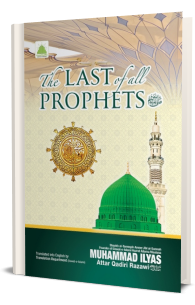
The Companions as the Prophet’s Poets
Muḥammad Musṭafā Anīs Aṭṭāri Madanī
Our master Muhammad صَلَّى الـلّٰـهُ عَلَيْهِ وَاٰلِهٖ وَسَلَّم is the most praised and described person in human history. In the Quran, Allah Almighty praises even the subtlest details of the Prophet صَلَّى الـلّٰـهُ عَلَيْهِ وَاٰلِهٖ وَسَلَّم , referring to him as the “wrapped one” (muzzammil), when he covered himself with a cloak, and as the “enveloped one” (muddathir) when he covered himself with garments during the early phases of revelation. Elsewhere, the Quran calls him Ṭāhā and Yāsīn, to list a few, timeless Quranic plaudits for Allah’s Beloved صَلَّى الـلّٰـهُ عَلَيْهِ وَاٰلِهٖ وَسَلَّم . The earlier prophets and messengers praised him as Allah shared with them his remarkable perfection, leaving them amazed and in awe of their future leader and superior صَلَّى الـلّٰـهُ عَلَيْهِ وَاٰلِهٖ وَسَلَّم . This prophetic tradition of praising our master Muhammad صَلَّى الـلّٰـهُ عَلَيْهِ وَاٰلِهٖ وَسَلَّم continued until the era of the Companions who embraced it with heart and soul. From them, the tradition was inherited by their students, the godly Followers, and then the next generation of believers, until today. And the rich tradition of writing and casting prose and poetry in praise of the most praiseworthy of Allah’s creation صَلَّى الـلّٰـهُ عَلَيْهِ وَاٰلِهٖ وَسَلَّم will continue until the Day of Reckoning and beyond.
The Companions رَضِىَ الـلّٰـهُ عَـنْهُم represent a unique generation of believers who basked in the Muhammadan beauty and quaffed from the Prophet’s spiritual outflow until his love took the reign of their very beings. As this love permeated their souls, they shared it with the world through nonpareil poetry in praise of their beloved. Hundreds of Companions cast poetry in praise of the Prophet صَلَّى الـلّٰـهُ عَلَيْهِ وَاٰلِهٖ وَسَلَّم, the most famous of which are our masters Hassān b. Thābit, ʿAbdullāh b. Rawāḥa, Kaʿb b. Zuhayr, and Kaʿb b. Mālik رَضِىَ الـلّٰـهُ عَـنْهُم.
Sayyidunā Hassān b. Thābit
When the polytheists publicised foul poetry against the Beloved Prophet صَلَّى الـلّٰـهُ عَلَيْهِ وَاٰلِهٖ وَسَلَّم, he ordered them to, “satirise the Quraysh, for satirising them is more potent against them than a volley of arrows.” Then he sent a message to Sayyidunā ʿAbdullāh b. Rawāḥa رَضِىَ الـلّٰـهُ عَـنْهُ to satirise the disbelievers of Quraysh. He heeded the command, but his poetry did not appeal to the Beloved Prophet صَلَّى الـلّٰـهُ عَلَيْهِ وَاٰلِهٖ وَسَلَّم , so he sent a message to Sayyidunā KaꜤb b. Mālik رَضِىَ الـلّٰـهُ عَـنْهُ , and finally, to Sayyidunā Hassān b. Thābit رَضِىَ الـلّٰـهُ عَـنْهُ .
When Sayyidunā Hassān b. Thābit came to the beloved Prophet صَلَّى الـلّٰـهُ عَلَيْهِ وَاٰلِهٖ وَسَلَّم , he said, “The time has come now. You sent a message to the lion who strikes with his tail.” He began lampooning the Quraysh with powerful metaphors and witty verses. “O Messenger of Allah صَلَّى الـلّٰـهُ عَلَيْهِ وَاٰلِهٖ وَسَلَّم ,” he then declared. “By the One who sent you with the truth! I will tear them with my words just as leather is torn.” The Messenger of Allah صَلَّى الـلّٰـهُ عَلَيْهِ وَاٰلِهٖ وَسَلَّم said, “Do not be hasty, for Abū Bakr is most familiar with the lineage of Quraysh, and my lineage is connected to them. ˹Go to him˺ so that Abū Bakr can separate for you my lineage from theirs.”
Thus, Sayyidunā Hassān رَضِىَ الـلّٰـهُ عَـنْهُ went to Sayyidunā Abū Bakr رَضِىَ الـلّٰـهُ عَـنْهُ and then returned, saying, “O Messenger of Allah! Abū Bakr has separated your lineage for me. By the One who sent you with the truth! I will extract you from them just as a hair is taken out from kneaded dough.”[1]
He deeply loved the Beloved Prophet صَلَّى الـلّٰـهُ عَلَيْهِ وَاٰلِهٖ وَسَلَّم and was devoted to him. After the Beloved Prophet صَلَّى الـلّٰـهُ عَلَيْهِ وَاٰلِهٖ وَسَلَّم was veiled from the world, Sayyidunā Hassān رَضِىَ الـلّٰـهُ عَـنْهُ wrote many poems about his grief, passion, and sincere love. There is one such eulogy in which he mentions the passing away of the beloved Prophet صَلَّى الـلّٰـهُ عَلَيْهِ وَاٰلِهٖ وَسَلَّم, his pulpit, his place of prayer, the weeping of the earth and heavens upon his demise, and a desire to receive the mercy of Allah Almighty and meet with the beloved Prophet صَلَّى الـلّٰـهُ عَلَيْهِ وَاٰلِهٖ وَسَلَّم in the Hereafter.[2]
The Beloved Prophet صَلَّى الـلّٰـهُ عَلَيْهِ وَاٰلِهٖ وَسَلَّم would also favour him, to the extent that he had a pulpit constructed for him in al-Masjid al-Nabawī, upon which he would stand and cast retaliatory poetry against the polytheists on behalf of the beloved Prophet صَلَّى الـلّٰـهُ عَلَيْهِ وَاٰلِهٖ وَسَلَّم, and defend him. The beloved Prophet صَلَّى الـلّٰـهُ عَلَيْهِ وَاٰلِهٖ وَسَلَّم stated, “Indeed, Allah Almighty will continue to aid Hassān by means of the Sanctified Spirit (al-Rūḥ al-Qudus) for as long as he defends Allah’s Messenger صَلَّى الـلّٰـهُ عَلَيْهِ وَاٰلِهٖ وَسَلَّم.”[3]
Sayyidunā KaꜤb b. Mālik
Among the 70 people who accepted Islam at the second pledge of ʿAqaba was the Anṣārī Companion, Sayyidunā Kaʿb b. Mālik رَضِىَ الـلّٰـهُ عَـنْهُ (d. 40 AH), who also had the honour of being a poet of the Prophetic court. He once asked the noble Prophet صَلَّى الـلّٰـهُ عَلَيْهِ وَاٰلِهٖ وَسَلَّم, “How is it to recite poetry?” The Beloved Prophet صَلَّى الـلّٰـهُ عَلَيْهِ وَاٰلِهٖ وَسَلَّم replied, “There is no harm; a Muslim performs jihad with the sword and tongue.”
His poetry aimed to demoralise the hostile disbelievers, discourage them from battle, and convey the message of Islam to them by boasting of the strength and courage of the Muslim and lauding the rich qualities of true faith. The efficacy of Sayyidunā Kaʿb’s poetry can be gauged from the fact that after listening to him recite only two couplets, the entire Daws tribe accepted Islam.[4]
Sayyidunā ꜤAbdullāh b. Rawāḥ a
Sayyidunā ʿAbdullāh b. Rawāḥa رَضِىَ الـلّٰـهُ عَـنْهُ (d. 8 AH), the poet of the Beloved Prophet صَلَّى الـلّٰـهُ عَلَيْهِ وَاٰلِهٖ وَسَلَّم, became a Muslim on the night of al-ꜤAqabah. The purpose of his poetry was to humiliate the polytheists for their disbelief. During the Battle of Khandaq, the Beloved Prophet صَلَّى الـلّٰـهُ عَلَيْهِ وَاٰلِهٖ وَسَلَّم would recite verses of his poetry which were on the rajaz meter.
When the Beloved Prophet صَلَّى الـلّٰـهُ عَلَيْهِ وَاٰلِهٖ وَسَلَّم entered Makka for the Umrah al-Qaḍa, Sayyidunā ʿAbdullāh b. Rawāḥa رَضِىَ الـلّٰـهُ عَـنْهُ was holding the reins of his camel and reciting poetry. Sayyidunā ʿUmar رَضِىَ الـلّٰـهُ عَـنْهُ asked, “Do you recite poetry in the Sanctuary of Allah Almighty and in the presence of Allah’s Messenger صَلَّى الـلّٰـهُ عَلَيْهِ وَاٰلِهٖ وَسَلَّم?” The beloved Prophet صَلَّى الـلّٰـهُ عَلَيْهِ وَاٰلِهٖ وَسَلَّم said, “O ʿUmar! Leave him, ˹for˺ his words are more impactful against the disbelievers than arrows and spears.”[5]
In many verses, Sayyidunā ꜤAbdullāh b. Rawāḥa رَضِىَ الـلّٰـهُ عَـنْهُ described the sublime beauty of the beloved Prophet صَلَّى الـلّٰـهُ عَلَيْهِ وَاٰلِهٖ وَسَلَّم. For example, he writes:
لَوْ لَمْ تَكُنْ فِيهِ آيَاتٌ مُبَيَّنَةٌ
كَانَتْ بَدِيهَتُهُ تُنْبِئُكَ بِالْخَبَرِ
Even if he had no clear signs within him,
His form alone would suffice as confirmation ˹of his prophethood˺.[6]
Sayyidunā KaꜤb b. Zuhayr
Another fortunate Companion who had the honour of lauding the beloved Prophet صَلَّى الـلّٰـهُ عَلَيْهِ وَاٰلِهٖ وَسَلَّم in verse was Sayyidunā KaꜤb b. Zuhayr رَضِىَ الـلّٰـهُ عَـنْهُ. Before embracing Islam, a state order had been issued to execute him: “Whosoever sees him, should neutralise him,” because of his active role against the Muslims. His brother, Sayyidunā Bujayr b. Zuhayr رَضِىَ الـلّٰـهُ عَـنْهُ, who had already accepted Islam, wrote to him, informing him that the merciful Prophet صَلَّى الـلّٰـهُ عَلَيْهِ وَاٰلِهٖ وَسَلَّم would forgive him if he accepted Islam. Thus, he came to the Beloved Prophet صَلَّى الـلّٰـهُ عَلَيْهِ وَاٰلِهٖ وَسَلَّم, who accepted his repentance and granted him amnesty.
It was on this occasion that he presented an ode in the Prophetic court, which is known as “Qaṣīdat Bānat Suʿād,” and it is also known as the original “Qaṣīdat al-Burda,” because after hearing this ode, the beloved Prophet صَلَّى الـلّٰـهُ عَلَيْهِ وَاٰلِهٖ وَسَلَّم gifted his own cloak to him.[7]
This cloak was later bought by Sayyidunā Amīr MuꜤāwiya رَضِىَ الـلّٰـهُ عَـنْهُ from the son of Sayyidunā KaꜤb b. Zuhayr.[8]
In one quatrain, he remarks:
اُنْبِئْتُ اَنَّ رَسُوْلَ اﷲ ِ اَوْعَدَنِیْ
وَالْعَفْوُ عِنْدَ رَسُوْلِ اﷲ ِ مَامُوْل
اِنِّیْ اَتَیْتُ رَسُوْلَ اﷲ ِ مُعْتَذِراً
وَالْعُذْرُ عِنْدَ رَسُوْلِ اﷲ ِ مَقْبُوْل
I received news that Allah’s Messenger had ordered ˹against˺ me
Yet, there is hope for forgiveness from Allah’s Messenger.
I hastened to Allah’s Messenger, apologising,
And apologies are accepted by Allah’s Messenger.[9]
Sayyidunā Kulayb b. Asad al-Haḍramī
A fortunate lady of Haḍramawt, Yemen, made a cloak and instructed her son to take it to the beloved Prophet صَلَّى الـلّٰـهُ عَلَيْهِ وَاٰلِهٖ وَسَلَّم. With a delegation, her son, Sayyidunā Kulayb b. Asad رَضِىَ الـلّٰـهُ عَـنْهُ reached the Prophetic court. There, he accepted Islam, and after handing over the gift, he recited:
أَنْتَ النَّبِيُّ الَّذِي كُنَّا نُخْبَرُهُ
وَبَشَّرَتْنَا بِكَ التَّوْرَاةُ وَالرُّسُلُ
You are the Prophet about whom we were informed,
And the Torah and earlier messengers gave us tidings of your advent.
The Beloved Prophet صَلَّى الـلّٰـهُ عَلَيْهِ وَاٰلِهٖ وَسَلَّم wiped his sacred hand over the face of Sayyidunā Kulayb b. Asad رَضِىَ الـلّٰـهُ عَـنْهُ. His children would boast of this honour.[10]
Children who would praise the Prophet صَلَّى الـلّٰـهُ عَلَيْهِ وَاٰلِهٖ وَسَلَّم
When the Beloved Prophet صَلَّى الـلّٰـهُ عَلَيْهِ وَاٰلِهٖ وَسَلَّم migrated to Madinah, the residents rushed out of their homes to greet him. The young girls of Madina recited the following poetry to welcome him:
طَلَعَ الْبَدْرُ عَلَیْنَا مِنْ ثَنِیَّاتِ الْوَدَاعِ
وَجَبَ الشُّکْرُ عَلَیْنَا مَا دَعَا لِلهِ دَاع
The Full Moon rose over us,
From the Valley of Wadāʿ.
Being thankful ˹to you˺ is our duty,
For you invited us towards Allah.[11]
There were many other Companions, men and women, who cast heart-warming poetry about the Beloved Prophet صَلَّى الـلّٰـهُ عَلَيْهِ وَاٰلِهٖ وَسَلَّم, depicting his physical appearance and painting a colourful word-portrait of his perfect qualities. May Allah Almighty have mercy on them and forgive us without accountability for their sake. اٰمین
[1] Ṣaḥīḥ Muslim, p. 1,038, ḥadīth 6,395
[2] Sīrat-e-Ibn Hishām, p. 583
[3] JāmiꜤ al-Tirmidhi, vol. 4, p. 385, ḥadīth 2,855
[4] Usd al-Ghābah, vol. 4, p. 514
[5] JāmiꜤ al-Tirmidhi, vol. 4, p. 385, ḥadīth 2,856
[6] Al-Iṣābah, vol. 4, p. 75
[7] ImtaꜤ al-AsmaꜤ, vol. 2, p. 88
[8] MuꜤjam al-Ṣaḥābah li ibn al-qāniꜤ, vol. 2, p. 381
[9] Al-MajmūꜤat al-Nabhāniyyah fi al-Madā'iḥ al-Nabawiyyah, vol. 3, p. 6
[10] Ṭabaqāt Ibn SaꜤd, vol. 1, p. 263
[11] Al-Bidāyah wan-Nihāyah, vol. 2, p. 583


















Comments